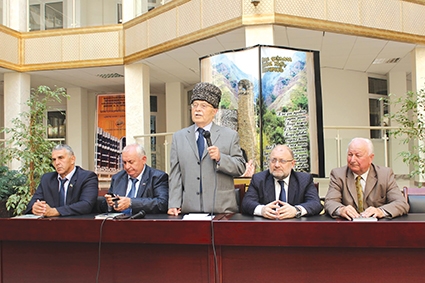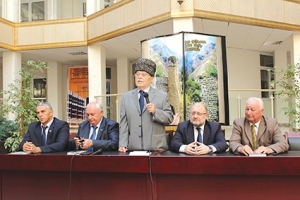Meet One Man behind the Re-Publishing of Rustaveli's Epic Poem in Chechen
This year is the UNESCO-declared Year of Rustaveli and many exciting events are on-going throughout the year to celebrate the fact, and not only in Georgia. The re-publishing of the translation of Shota Rustaveli’s epic poem ‘The Knight in the Panther’s Skin’ into Chechen was made possible by, amongst others, Chechen Abdullah Haji Kindarov, Member of the Russian Union of Writers. GEORGIA TODAY spoke to him about it.
Tell us a little about yourself and your connection to Georgia
I occupy a very modest place in this life. But I can say I have dedicated myself in deep respect and reverence, to Georgia and the Georgian people. Why? The rich history of the land, dating from the depths of centuries; the unique, ancient but always up-to-the times culture; the freedom-loving, proud and wise people who gave the world many outstanding public figures. Moreover, we are close neighbors with ancient strong ties, similar historical destinies. Without our people, majestic Caucasus could not be imagined.
I belong to the generation of Chechens who were, with cruel perfidy, deprived a childhood, deprived a statehood, and were expelled from their native land. We were doomed to a hungry and powerless existence for 13 years, but people survived thanks to a deep hope for the mercy of the God, and thanks, too, to their steadfastness and cohesion - qualities inherent in Caucasians.
I will say without pathos: for us, while away from home, almost the only bright beam warming the soul and heart was the Georgian culture, occasionally coming to us in the form of songs on the radio, movies, and books. When we were students we reviewed many times the films "Giorgi Saakadze," "Arsen," "Dragonfly," and others, memorizing the dialogues of heroes and singing their songs.
We read the Russian translation the great poem of Shota Rustaveli 'The Knight in the Panther's Skin', memorized large chunks of it and recited them to our peers.
We learned the names of many Georgian writers and poets, especially A. Kazbegi, V. Pshavela and other classics, who even mentioned the word ‘Chechen’ in their works. In conditions of severe regime, when for us "special settlers" our Chechen song and music could not be heard on the radio or stage, to read in the press at least the word ‘Chechen,’ warmed our souls, keeping our hearts in touch with their native land.
What are the links between the two countries?
We have a lot of similarities in culture and communication in everyday life.
For one, the great contribution of the Georgian creative intelligentsia, especially in our choreography and theater.
From the very first days of the birth of the Chechen-Ingush Drama in 1934, it was actively helped by the Georgian Theater of Shota Rustaveli, headed by S. Akhmeteli. Young director Archil Ckhartishvili was sent to the same theater in Grozny, where he staged performances of plays by Georgian and Chechen playwrights.
In the 1930s, composer G.H. Mepurnov worked very productively in the country – he was Georgian by nationality. In 1936, he created the first Chechen-Ingush professional orchestra of folk instruments, composing and recording original local national music.
For a long time, and with great dedication, Otar Mundzhishvili, a lecturer at the School of Culture and Education, worked as director in various ensembles.
And the translation and publishing of Rustaveli’s poem "The Knight in the Panther's Skin" into the Chechen language.
UNESCO declared 2016 the Year of Rustaveli. Tell us about that translation into Chechen
Let's start with the fact that the poem is an outstanding work of world literature for all times and nations. It is fabulously rich in content and presentation, and is original in its artistic image of motives and actions of characters that move the most beautiful impulses- doing good, serving faithful friendship and love. The hero triumphs over evil, hostility and greed in humans.
We wanted our modern youth to be acquainted with Eastern wisdom in the Chechen language- convinced that this would help to enrich their horizons, literary and artistic taste, in-depth knowledge of the native language, and would strengthen friendship with the Georgian people.
The author of the translation, Nurdin Dzhamaldinovich Muzaev, was the son of rural mullahs and graduated the Moscow Institute of Journalism. In 1941 he went to the War, fighting at Stalingrad, where he was wounded and sent to the reserves in Kirgistan. There, he learned to teach and after returning home, he enrolled at the Chechen State University, graduating with a PhD in philology. Author of more than 30 books, he translated works of A. Pushkin, M. Lermontov, and V. Mayakovsky from Russian into Chechen. He was a member of the Writers' Union from 1934.
N.D. Muzaev began translating "The Knight in the Panther's Skin" in the 1920s, when he was very young. In 1969, a complete translation was published in Grozny. Luckily, his daughter found copies of the magazine in which had been issued, in small editions, the full text of the translation. We republished and distributed it to all 700 libraries of the Republic, in the first place to every school in Chechnya. Presently, every library holds three copies of the book of the poem of the great Georgian writer!
We are very proud that it happened in this anniversary year.
Will you be visiting Georgia soon?
At my age, I think it would be imprudent and arrogant to build any big plans for the future. However, if circumstances allow, a visit to Georgia would make me extremely happy.
Dimitri Dolaberidze












